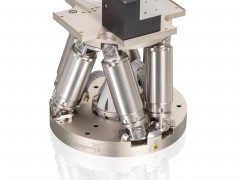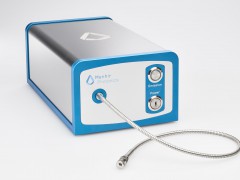
Tunable Laser Diode Taps NIR for Data Transmission
source:photonics.com
release:Julie
Time:2015-06-15
Tapping into undeveloped frequency bands, a new ultracompact heterogeneous-wavelength laser diode could enable higher-capacity optical data transmission systems.
The device combines silicon photo
nics and quantum-dot (QD) technology and demo
nstrates wide-range tuning operation around 1230 nm, according to researchers at Tohoku University and the Natio
nal Institute of Information and Communications Technology (NICT) in Japan.

The novel heterogeneous-wavelength tunable laser diode consists of quantum dot and silicon photonics technology. Courtesy of Tomohiro Kita/Tohoku University.
Its optical gain medium is made up of high-quality InAs QDs grown with the sandwiched subnano separator technique. The wavelength-tunable filter was co
nstructed with ring reso
nators fabricated using silicon photo
nics techniques.
Heterogeneous-wavelength tunable laser diode
The novel heterogeneous-wavelength tunable laser diode co
nsists of quantum dot and silicon photo
nics technology. Courtesy of Tomohiro Kita/Tohoku University.
Current high-capacity optical transmission systems are ba
sed on wavelength-division multiplexing (WDM) systems with dense frequency channels. Frequency channels in the standard C-band (1530 to 1565 nm) are overcrowded, and the frequency utilization efficiency is saturated in such WDM systems, the researchers said. On the other hand, there are extensive and unexploited frequency resources at near-infrared wavelengths (1000 to 1300 nm).
The new diode is a promising candidate to realize a compact and broadband light source for this region, the researchers said.
Funding came from the Strategic Information and Communications R&D Promotion Program (SCOPE) of Japan's Ministry of Internal Affairs and Communications.
The research was published in Applied Physics Express (doi: 10.7567/APEX.8.062701).
MOST READ
- RoboSense is to Produce the First Chinese Multi-beam LiDAR
- China is to Accelerate the Development of Laser Hardening Application
- Han’s Laser Buys Canadian Fiber Specialist CorActive
- SPI Lasers continues it expansion in China, appointing a dedicated Sales Director
- Laser Coating Removal Robot for Aircraft
PRODUCTS
 FISBA exhibits Customized Solutions for Minimally Invasive Medical Endoscopic Devices at COMPAMED in
FISBA exhibits Customized Solutions for Minimally Invasive Medical Endoscopic Devices at COMPAMED in New Active Alignment System for the Coupling of Photonic Structures to Fiber Arrays
New Active Alignment System for the Coupling of Photonic Structures to Fiber Arrays A new industrial compression module by Amplitude
A new industrial compression module by Amplitude Menhir Photonics Introduces the MENHIR-1550 The Industry's First Turnkey Femtosecond Laser of
Menhir Photonics Introduces the MENHIR-1550 The Industry's First Turnkey Femtosecond Laser of Shenzhen DNE Laser introduced new generation D-FAST cutting machine (12000 W)
more>>
Shenzhen DNE Laser introduced new generation D-FAST cutting machine (12000 W)
more>>





